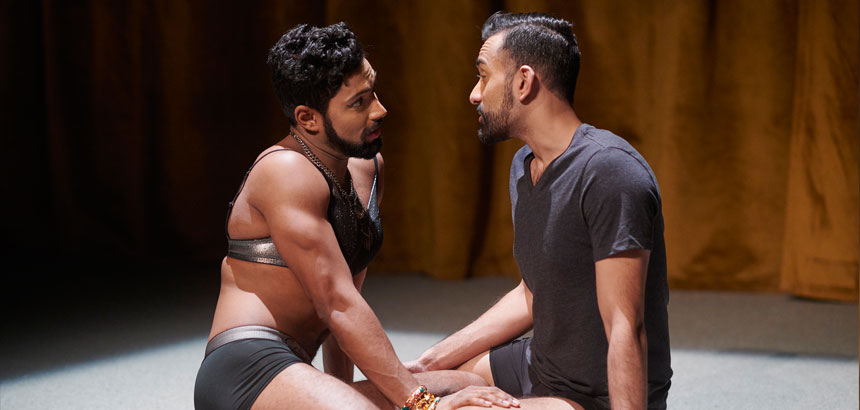We, kumari and Harris, attended both a preview and post-opening show of Acha Bacha, co-presented by Buddies in Bad Times Theatre and Theatre Passe Muraille. As folks who work alongside Bilal on the acolourdeep.ca collective, we were both looking forward to seeing Bilal’s work and seeing representations of queer, Pakistani, Muslim relationships and love. We wondered how queerness, religion, family, suburbs, gender, sex, trauma, and community would collide. We asked ourselves how they connect to each other? How do they collide uncomfortably? Did they connect as we expected? How did they differ? How did we as QTPOC see connections differently than straight and queer white folks?
Acha Bacha portrays the journey of Zaya’s relationship with his sexuality and religion in relation to his partner, mother, and memories of the past. The show retraces traumatic events of Zaya’s childhood; first, a glimpse, then some memories, then a flood of them all while Zaya’s day unfolds. It is one of the most real depictions of trauma, I [kumari] have seen on stage. The flashbacks and memories reveal how Zaya has navigated his life and internal feelings about queerness, femininity, and Islam. But this show is much more complex than a story about trauma, this journey through the intersections of race, gender, sexuality, Islam, family, 2nd generation life, and suburbia collides and had the two of us (kumari and Harris) chatting for hours.
The play opens with intimacy on stage – the image is so striking and tells the audience “hey we aren’t going to shy away from things!” Immediately we are hit by the way the play challenged expectations of how different worlds can connect and collide. The sexual relationship between a femme genderqueer person and a cis-gay man didn’t rely on heteronormative ideas about sex – woman pleases man, centres male pleasure. There was caring and eager reciprocity. To make their relationship more real and complex; Salim provides emotional support as Zaya relives trauma, which is common throughout the show – establishing a norm, then deepening and creating more nuance for each character and moment.
We asked ourselves, did being around QTPOC in the audience create more discomfort? What is our relationship to seeing queer, brown sex and intimacy on stage? How does it change being surrounded by white folks in the audience? How does it change when surrounded by QTPOC? In any case, there was/is lots of space for us (Harris, kumari and audience members) to be challenged in the show.
Traditional expectations of religion, Islam, and gender presentation are portrayed early in the show, and we are hinted to pit them against each other. We know this isn’t entirely true, as our communities have many folks who practice Islam who are queer and/or trans. Salim is a gift to those navigating gender variant identities and faith – they are empowered and hold the contradictions of being more visibly ritualistic in their practice of Islam than Zaya, while embracing femininity, specifically wearing the Dupatta, a symbol of cultural and religious significance, during prayer. There is, however, an expectation of binary gender norms within Islam that Salim calls into question in a very visible portrayal of resistance and complicated identities.
Will audiences see the play and demonize Islam or the Maulana? How is this play received within a culture of Islamophobia and negative stereotypes of Muslim men? Will folks draw parallels between the play and the Catholic church?
Then, we talk about Zaya’s relationship with his mother, and our relationships with biological family – to which we both grew up with and are still connected to. Harris reveals the protection and responsibility, in Pakistan and in 2nd generation Pakistani culture, that children have for their parents. The ways Zaya leaves his relationship with Salim out of the conversation with his mother, to circumvent additions to her own collections of trauma, speaks to this care. There is clearly a relationship of love between Zaya and his mother, but many pieces remain unaddressed – as if in a bubble of silence, where everyone knows but no one talks about it. Zaya’s mom refusing to acknowledge Salim, is a very potent and literal symbol of how bio-family fails to address queerness and transness in our communities, pretending nothing is happening, remaining in silence, disapprovingly. But, this is not to say that that this is the case always and forever. In Acha Bacha, we see this relationship grow with compassion and care across the scenes.
How do QTPOC negotiate the ways queerness is connected to our relationships with parents? What conversations do we need to have with partners and friends to navigate this?
The strength of the show is making visible the messiness of identities and the ways each person resists. We identified with portrayals moving between our complicated identities to survive – leaving the burbs to live in Toronto as adults to feel safer/surrounded by other queers, and then having to revisit the burbs for family, and changing dress or behaviour to connect. The references to Mississauga were a nice – and hilarious – shout out to all those who know the struggles of suburb life. kumari suggests that having compartmentalized lives is a reality, but also a resiliency strategy so QTPOC can have many different spheres of relationships, which may include ones with bio-fam.
In conversation, there are so many more points that we can’t capture here – we literally spoke for 10 hours about the show, our thoughts and different interpretations. We also spoke about the impact this has on our world at large. As we write this, details of a serial killer who killed mostly South Asian gay men in the city are being revealed. We wonder, how our futures will be different when we realize and honour that we as humans hold complex identities? How would media narratives change? We wonder how theatre and the arts play a role in uplifting and bringing nuance to our varied experiences as queer people, gender non-conforming people, people of colour, 2nd generation families? Beyond demonization, beyond victim narratives, how do we ensure work like this gets put on stages for wide audiences to have a glimpse into the ways our identities and experiences collide?
We can agree on one thing, that there needs to be more of this. Funding young queer genderqueer writers work, like Bilal’s, is really important. There’s a need for writers, actors, directors and producers who can write well the complexities of experiences that bring together these communities. When the complexity is revealed, it allows us (QTPOC) to be represented more fully, and for audiences everywhere to have access to more nuanced story lines. Otherwise, we have singular storylines to reflect our multi-dimensional characters.
Go see the show. Think about it. Talk with your friends.
photo by Michael Cooper


